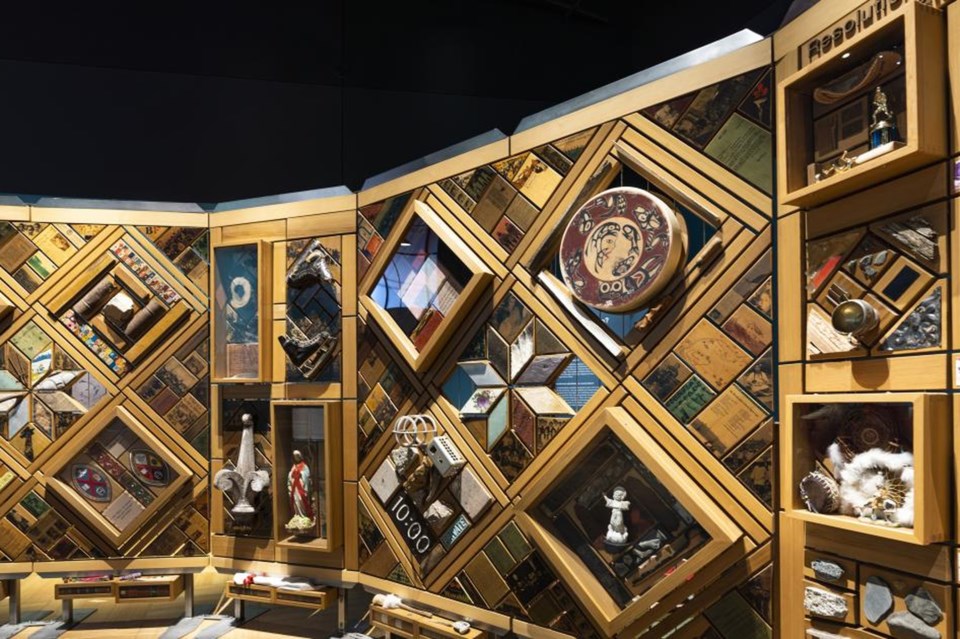Flin Flon will play host to an acclaimed art piece this summer meant to honour Indigenous history and pay tribute to those who suffered at residential schools.
A replica of The Witness Blanket, coordinated by a group of local artists and the Canadian Museum for Human Rights (CMHR), will make its way north this summer for a six-week exhibition. The piece will be presented at Flin Flon City Hall inside council chambers from June 12-July 22.
The Witness Blanket is a large-scale piece of artwork, consisting of hundreds of items found and reclaimed from former residential school sites across Canada. The items are combined within a cedar frame collage-style and presented as a history lesson to show the impact left behind by the schools. Kwakwa̱ka̱ʼwakw artist Carey Newman, whose family members were taken to residential schools as children, created the project in 2013 and 2014, using hundreds of different items including books, letters, photos, art and other artifacts from 77 different communities across Canada.
“The blanket is a universal symbol of protection. For many of us, it identifies who we are and where we’re from. We wear blankets in ceremony and give them as gifts. Blankets protect our young and comfort our elders,” reads the project’s website.
“The Witness Blanket is a large-scale work of art inspired by a woven blanket. It contains hundreds of items. They were reclaimed from residential schools, churches, government buildings and traditional and cultural structures from across Canada. It stands as a national monument to recognize the atrocities of the Indian residential school era. It honours the children and the survivors. It symbolizes ongoing reconciliation.”
The piece was first shown at the CMHR in 2015 through to 2016.
“It is so powerful and personal,” said Megan Dupas, manager at the NorVA Centre and Gallery. Dupas, along with the centre’s inclusion committee - consisting of local artists, Indigenous leaders, elders and others - pushed to have the project brought to Flin Flon, dating back as early as last year. The Flin Flon Aboriginal Friendship Centre, City of Flin Flon, committee members with NorVA and the CMHR are all involved with organizating the exhibit.
“We’ve been working on this for about a year," she said.
Dupas said the presentation of the blanket will include both an opening and closing ceremony, featuring an emphasis on Indigenous culture and traditions, the same kind that the residential school system was designed to - and failed to - snuff out.
“We want to have pipe carriers, calling to the four directions, youth hand drum groups, women singers groups, a great sort of celebration of these Indigenous traditions that have survived, despite what residential schools attempted to do which was to destroy these beautiful traditions,” Dupas said.
“We think that would be a great sort of way to do this. We want this to be community-centred - we want everybody to come together around this.”
The blanket itself is a large exhibit, 35 feet in length - too long to be featured at NorVA. City council chambers are just big enough to host the exhibit.
No residential schools operated in the immediate Flin Flon area, but several such schools were located around the north, including in Sturgeon Landing, Clearwater Lake, La Ronge, Cross Lake and Norway House. Many Indigenous people living in Flin Flon and in neighbouring communities like Pelican Narrows, Sandy Bay and elsewhere were taken to the schools.
Dupas said the exhibit has been known to produce varied emotional reactions, especially for people who have been affected for residential schools. She said the goal for the project is to both acknowledge the past and to help build toward reconciliation and a better future.
“We know it's going to affect everyone differently. I think it's about representation and of acknowledgement of past wrongs, that it was a really traumatic experience for the children and the families. Some people are definitely going to relive negative trauma and negative memories, but I hope everyone comes together around it,” Dupas said.
“You can't change what you don't acknowledge has happened. I think especially it's big for the City of Flin Flon for having this in the council chambers, because government and Indigenous relations have not been always the greatest - they're still arguably not in good shape - and I hope it helps bring about more reconciliation efforts in Flin Flon.”
The number for the National Residential School Crisis Line is 1-866-925-4419. The line is open 24 hours per day and is meant to provide support for people affected by residential schools.




